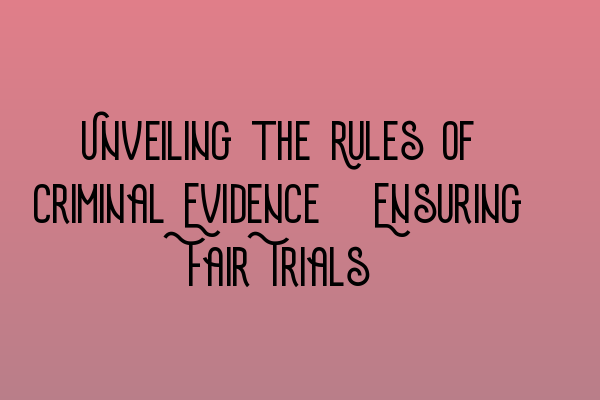Unveiling the Rules of Criminal Evidence: Ensuring Fair Trials
Introduction
In the realm of criminal law, the concept of evidence holds significant importance. It acts as the backbone of any criminal trial, playing a crucial role in establishing guilt or innocence. The rules governing the admissibility and handling of evidence are designed to ensure fair trials and maintain the integrity of the criminal justice system. In this article, we will delve into the intricacies of criminal evidence, exploring its rules and their impact on the trial process.
The Importance of Fair Trials
Fair trials are fundamental to a just society, as they protect the rights of the accused and ensure that justice is served. The rules surrounding criminal evidence are instrumental in safeguarding these principles. They set standards for the admissibility of evidence, ensuring that only relevant and reliable material is presented to the court. This prevents the wrongful conviction or acquittal of individuals based on misleading or prejudiced information.
By adhering to the rules of criminal evidence, courts can maintain public trust and confidence in the legal system. Defendants can rest assured that their cases will be decided based on genuine evidence rather than speculation or biases. Fair trials are a cornerstone of a functioning democracy, and these rules uphold the principles of justice, equality, and due process.
The Role of Admissible Evidence
Admissible evidence is the type of evidence allowed in court proceedings. Various rules govern whether evidence is admissible or inadmissible. These rules ensure that evidence is obtained legally, preserved properly, and reliably establishes facts relevant to the case at hand.
One significant rule is the exclusionary rule, which excludes evidence obtained through illegal searches or seizures. This rule protects individuals from unlawful intrusions by law enforcement agencies and maintains the sanctity of privacy rights. Additionally, the rule of relevance determines whether evidence is directly related to the facts in a case.
It is crucial for legal practitioners to navigate through these rules to exploit admissible evidence in support of their clients’ cases effectively. SQE 1 Practice Exam Questions can provide valuable insights and practice to aspiring legal professionals in understanding and applying the rules of evidence.
The Presumption of Innocence
The presumption of innocence is a cornerstone of criminal law. It presumes that a defendant is innocent until proven guilty, placing the burden of proof on the prosecution. The rules of criminal evidence play a crucial role in upholding this presumption. They ensure that evidence presented in court is sufficient to establish guilt beyond a reasonable doubt.
To ensure fair trials, legal practitioners must meticulously analyze the admissibility of evidence. This involves assessing the reliability, relevance, and credibility of potential evidence. The SQE 1 Practice Mocks FLK1 FLK2 can aid law students and aspiring solicitors in honing their skills in evaluating evidence and effectively arguing for its exclusion or inclusion in court.
Cross-Examination and Expert Witnesses
Cross-examination is a critical component of the trial process, allowing legal practitioners to test the credibility and accuracy of witnesses’ evidence. The rules of criminal evidence guide the cross-examination process, ensuring that it remains fair and effective.
Moreover, expert witnesses provide specialized knowledge or opinions that may assist the court in understanding complex matters. However, their evidence is subject to stringent rules to prevent undue influence or misleading presentations. Understanding these rules is essential for legal professionals to effectively challenge expert evidence or present their own.
To prepare for cross-examination and understand the intricacies of expert witness evidence, legal practitioners can benefit from comprehensive SQE 2 Preparation Courses. These courses equip professionals with the necessary skills to navigate the challenges of the courtroom and ensure fair trials for their clients.
Conclusion
The rules of criminal evidence form the foundation of fair trials, ensuring that justice is served within a democratic society. They establish standards for admissible evidence, protecting the rights of the accused and maintaining public trust in the legal system. To become proficient in navigating these rules, legal professionals can enroll in SQE 1 Preparation Courses and stay up-to-date with SRA SQE Exam Dates to fulfill the requirements of the SQE Criminal Law & Practice Law UK.
